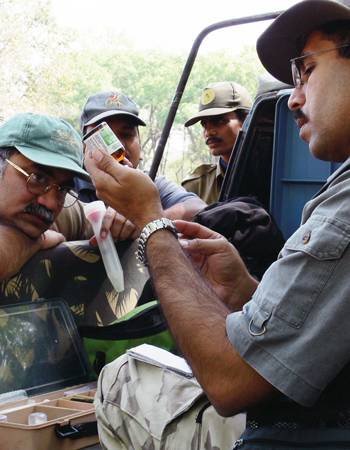Dr Y V Jhala and Qamar Qureshi
Wildlife Service Awards (2008)
Dr. Y.V. Jhala’s credentials are impeccable. A doctorate from the Virginia Polytechnic Institute and State University, U.S.A. in Wildlife Science, a stint at the Wildlife Conservation and Management Training Programme of the Smithsonian Institution, a post-doctorate on reproductive energetics of tree shrews and a long-standing career with the Wildlife Institute of India (WII) that began in 1993. Apart from this, he is also a Ph.D. guide for the Saurashtra University, Forest Research Institute, Dehradun and Sagar University, M.P. One of India’s most eminent wildlife scientists, he has studied nutritional ecology and prey-predator interactions and has worked on a systems approach for ecosystem research, on physiological ecology and optimisation for the management of wildlife resources. He is credited with conducting one of the most technologically sophisticated research studies on these little understood carnivores. Professor Scientist in the Department of Animal Ecology and Conservation Biology at the WII, he leads research initiatives, nurtures, teaches and guides postgraduate and Ph.D students and supervises over 50 wildlife biologists who are our future Protected Area Managers.
Qamar Qureshi's career as faculty with the WII began in 1993. Earlier, he obtained an M.Phil in Wildlife Biology from the Aligarh Muslim University. He is an expert in Geographical Information System and Remote Sensing. He has done extensive research in the Terai, Central Indian Highlands and the Trans-Himalaya ranging from community ecology to species biology. He has a special interest in landscape ecology.
Jhala and Qureshi worked jointly on behalf of the WII and the National Tiger Conservation Authority to enumerate India’s tiger populations. The resultant report revealed a disturbingly low official figure of 1,411 tigers and has resulted in several fresh conservation initiatives that are expected to give the tiger an extra edge on life.


